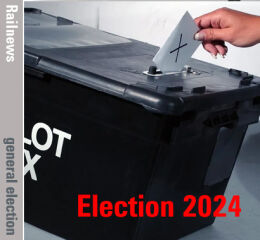Posted 11th June 2024 | 3 Comments
Conservatives would use GBR to increase private sector role

The Conservative Party has confirmed in its manifesto that, if elected, it would create Great British Railways, which was envisaged in the 2021 Rail Review and described then as the industry’s ‘guiding mind’.
GBR would be responsible for increasing the part played by the private sector in the rail industry, including the expansion of open access passenger services ‘to bring greater choice’.
The Conservative manifesto says: ‘GBR will usher in a revitalised private-public partnership, delivering a modern and innovative railway with reliable services, and simpler tickets.’
It also says that that ‘outdated working practices’ will be addressed in its forthcoming Rail Reform Bill, a proposed law which would be included in the King’s Speech at the opening of the next Parliament.
Other Conservative railway plans include national mobile pay-as-you-go contactless tickets, an evaluation of proposals to continue the Borders Railway from Tweedbank to Hawick and Carlisle, an updated East Coast Main Line timetable, electrification of the North Wales main line, improvements on the South Wales main line, more reopenings and investment in the line through Dawlish, the Energy Coast [Cumbrian Coast] line and the Ely Junction scheme in East Anglia, and improved accessibility at 100 stations, including the 50 announced in May.
The Northern Powerhouse Rail project would continue, including electrification to Hull and a new station for central Bradford. The Midlands Rail Hub would also be funded with £1.75 billion.
In addition, the manifesto says ‘We are committed to all the schemes set out in the Network North Command Paper,’ and that the Conservatives will ‘support the growth of the rail freight sector’. although no further details are given.
Nothing is said about how National Rail Contracts could change or be re-awarded in future, nor if the four nationalised English train operators would be returned to the private sector.
Reader Comments:
Views expressed in submitted comments are that of the author, and not necessarily shared by Railnews.

Greg T, London
TRANSLATION
The tories will extract more money into their friends pockets
david C smith, Bletchley
A nightmare situation with the railway undergoing renationalisation, and then reprivatised in a few years' time , etc ., etc., ? Just what is not needed, a wreck of cyclical upheavals for ever and ever.
So , is there an alternative ? Remember the Sectorisation that occurred under the two Bob Reids ? Some Sectors were Obvious candidates for public ownership / management ( Network Southeast eg ), basically all the natural monopoly sectors with captive markets. But others, like Intercity and Raifreight , are obvious candidates for a fuly commercial / private appproach.
The diversity of rail transport seems to call for more than just one uniform model , but existing "in parallel", rather than in a politically inspired "oscillating" model.
Jonathan Brain, Potters Bar
They mention simpler tickets and then contradict that with proposals to expand open access services and national mobile pay-as-you-go contactless tickets.
A better approach would be to aim 'to simplify the ticketing system using current technology'.
Start by going back to a paper ticket with only one price available for a journey plus an optional chargeable seat reservation (or booked non-reservable service) valid on any train / operator, at any time via any permitted route.
The only machine readable information on the ticket will be the unique ticket number. All stations, services used and time of travel will be centrally recorded at end of journey and that paper ticket number becomes a cash equivalent discount (if any applicable, depending on operator, time of travel, route) voucher towards cost of next rail journey. The discount will automatically include any delay repay and a refund on any chargeable reservation fee IF the passenger travelled by the reserved service.
The discount will be valid for 12 months and transferrable. All that is needed is the original ticket number and receipt / ticket or equivalent.
For privacy journey details will be destroyed after 3 months. During that time the passenger can request the discount be recalculated - in some cases it may be difficult to calculate the correct amount automatically.
From a passenger point of view it is easy to buy a ticket knowing that they can travel on any convenient service on the day of travel, subject to space being available. For operators the fare can be correctly divided between operators according to the services / route the passenger actually used.
Using the ticket number the passenger can, with a web browser / application, see the discounts available depending on operator / time of travel and the permitted routing options. They can also see details of the journey used by that ticket number.
For railcard holders it becomes even easier.
The ticket number will be linked to the railcard.
Optionally credit can be added to that railcard - like a TFL Oyster card,
The passenger can then make any journey up to their current credit.
If the railcard holder wishes it can be made easier still by linking the railcard to a debit/credit card account. The amount they are charged will automatically include any applicable discount (which can still be challenged in the above 3 month period).
That involves a major mindset / working practice change but the pain and investment will be worth more in the long run than implementing national mobile pay-as-you-go contactless tickets.